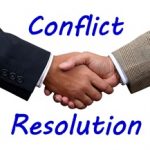 As unpleasant as it is, conflict is an ever-present and potentially costly danger. When people come together in a work environment, we should expect that at some point, conflict will rear its ugly head, rather than hope or assume it will not happen. Knowing that most conflict is initiated either from incongruence of values or lack of clear expectations, here are some proven strategies to prevent it and/or mitigate it effectively:
As unpleasant as it is, conflict is an ever-present and potentially costly danger. When people come together in a work environment, we should expect that at some point, conflict will rear its ugly head, rather than hope or assume it will not happen. Knowing that most conflict is initiated either from incongruence of values or lack of clear expectations, here are some proven strategies to prevent it and/or mitigate it effectively:
- Adopt an outward mindset; one where you intentionally think empathetically towards others. If we have needs, desires and challenges in our lives, others surely do as well. When placing ourselves in others’ shoes, conversations become much more about how can we help each other vs how I can win.
- Be proactive; that is, be interested vs interesting. This simple strategy can divert most conflict before it ever begins. All people have an innate desire to be heard, so when compelled to state your case, do so clearly and concisely, being sure to invite a rebuttal from the other person. “Now I would like to hear your thoughts. What do you see as a viable solution to this issue?”
- When confronted with potentially contentious issues, be intentional about keeping emotions in check. Most of us are conditioned to react emotionally vs responding constructively. As hard as this is, practice makes perfect. A well-delivered, non-emotional response can defuse an otherwise highly charged situation and lead to quicker resolution.
- When stating your case, state facts only. A conflict should not be allowed to degenerate into personal battle of accusations and assumptions regarding another’s shortcomings or failures. State the facts; “You did not complete the work the way we both agreed you would.” Then, explain the negative consequences of the behavior or performance; “Because of this error, the customer is upset and the schedule is delayed costing us a significant loss of profit.” And finally, ask a compelling question like “What do you need to change to make this work for you?”
- Clarify and re-clarify expectations! When expectations are not clear, we cannot expect others to be accountable. People will dispute us all day long with excuse after excuse when subject to perceived unjust criticism. Accountability comes from a clear understanding between parties regarding who is doing exactly what and by when. In fact, accountability must be chosen and can never be forced. To think we are entitled to it is to invite conflict. As author Greg Groschel has noted: “If you delegate tasks you raise up doers. If you delegate authority you raises up leaders.”
Resolving conflict requires taking responsibility. That means being the person who will break the cycle of toxic behaviors and choose to think and behave differently in the heat of the battle. We can all choose to be that person.
